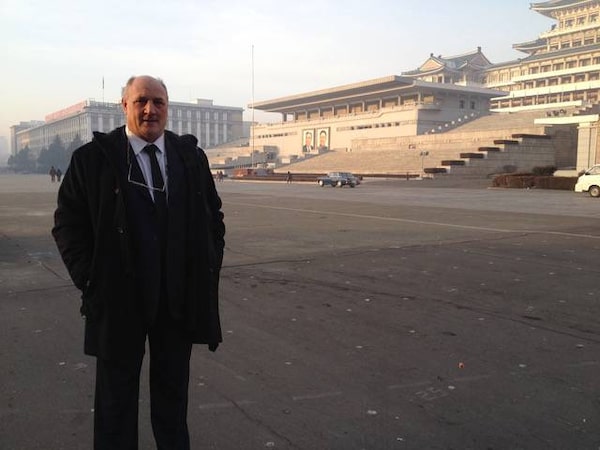
Thomas Fisler.
Over the four years he spent living and working in North Korea, Thomas Fisler grew accustomed to two realities. One, from outside the country, showed harsh new international measures meant to choke the North Korean economy. The other, visible in Pyongyang's stores and across the countryside, showed almost no discernible evidence that sanctions were having any effect.
Shops remained stocked with fridges and electric bikes. Mr. Fisler could glimpse large foreign currency bills in the wallets of middle-class people in Pyongyang, some of them making daily use of taxis that, at $3 (U.S.) a ride, would have been unaffordable a decade ago. The price of rice has gone unchanged. Rural farmers continue their business largely unaffected.
Amid the tensions provoked by North Korea's tests of nuclear devices and intercontinental ballistic missiles, the international community retaliated with increasingly strict new sanctions.
Mr. Fisler led the Swiss Agency for Development and Cooperation in Pyongyang before leaving in October. His time there gave him some of the lengthiest recent experience in North Korea among foreigners.
"Outside Pyongyang, these people are living on subsistence, anyhow – there is literally no trade," Mr. Fisler said. "And in Pyongyang, the shopping malls are as full as ever."
There was just one major exception: humanitarian work, which has come under severe pressure in North Korea, Mr. Fisler and the United Nations are warning.
It's not clear where the goods stocking Pyongyang stores are coming from, although roughly 90 per cent of North Korea's foreign trade comes from China, which has said it is enforcing sanctions but does not have a formal presence at the Vancouver summit this week.
The high profile of restrictions against North Korea has caused some companies to cease all trade with the isolated country, for fear of accidentally coming in contact with some sanctioned item that could have them fall afoul of authorities and harm their business elsewhere, Mr. Fisler said.
Inside North Korea, fuel prices have nearly doubled, but those prices seem to apply largely to international organizations, Mr. Fisler said: private cars remain rare, while military and government fleets appeared to have the right to buy at a lower price.
International agencies, meanwhile, have also been hit hard by the closing of banking channels to North Korea. Mr. Fisler had little choice but to enter the country with as much as $300,000 in cash stuffed into his carry-on luggage.
Larger organizations are in worse shape, he said, in particular United Nations agencies with larger budgets. In the current climate, "they have severe difficulties to keep operational. There's no doubt," Mr. Fisler said. UN agencies have also experienced trouble bringing vaccines and powdered milk into North Korea, Mr. Fisler said – despite clear exemptions for such materials. Representatives of the UN have begged the committee in charge of sanctions to emphasize that humanitarian goods should not be affected by international measures.
A UN official confirmed Mr. Fisler's account, speaking on condition of anonymity because of the sensitivity of the matter. Crucial relief items have been held up for months despite having correct paperwork, the official said, and financial issues have significantly threatened the UN's ability to continue humanitarian operations in North Korea. The UN has tried to compensate by buying goods and paying salaries outside the country, the official said.
Private charities have struggled against similar roadblocks. This week, First Steps, a Canadian charity that provides nutritional supplements to North Korean women and children, released a video appeal.
"Increasingly severe sanctions are increasing suffering," the video says. "Shouldn't we create a space to fast-track humanitarian aid?"
Mr. Fisler believes sanctioning nations must pay more attention to humanitarian needs in North Korea.
He supports trade measures, as long as they are used as a tool toward reviving talks, and believes they will eventually have an effect in North Korea, perhaps by forcing "the government to put infrastructure improvements on hold, be it transport systems, railroads or power lines."
But, he said, the North Korean government has used sanctions to rally support at home, by "telling everyone the evil U.S. imperialists are responsible for what happens, and so we've got to sit together closer and go through tougher times," Mr. Fisler said. "And that's what they do. They are fairly stoic in saying, 'we've had sanctions over many years – let them be tougher. It doesn't bother us.' "
He warns, however, that placing North Korea in a vise that becomes too tight could press the country into more "illegal actions, like the drug trade. Methamphetamine – they can make billions with that, easy – or fake currency," he said.
"If they are pushed to the edge with these sanctions, it will backfire."
With a file from Ottawa bureau chief Robert Fife.
 Nathan VanderKlippe
Nathan VanderKlippe